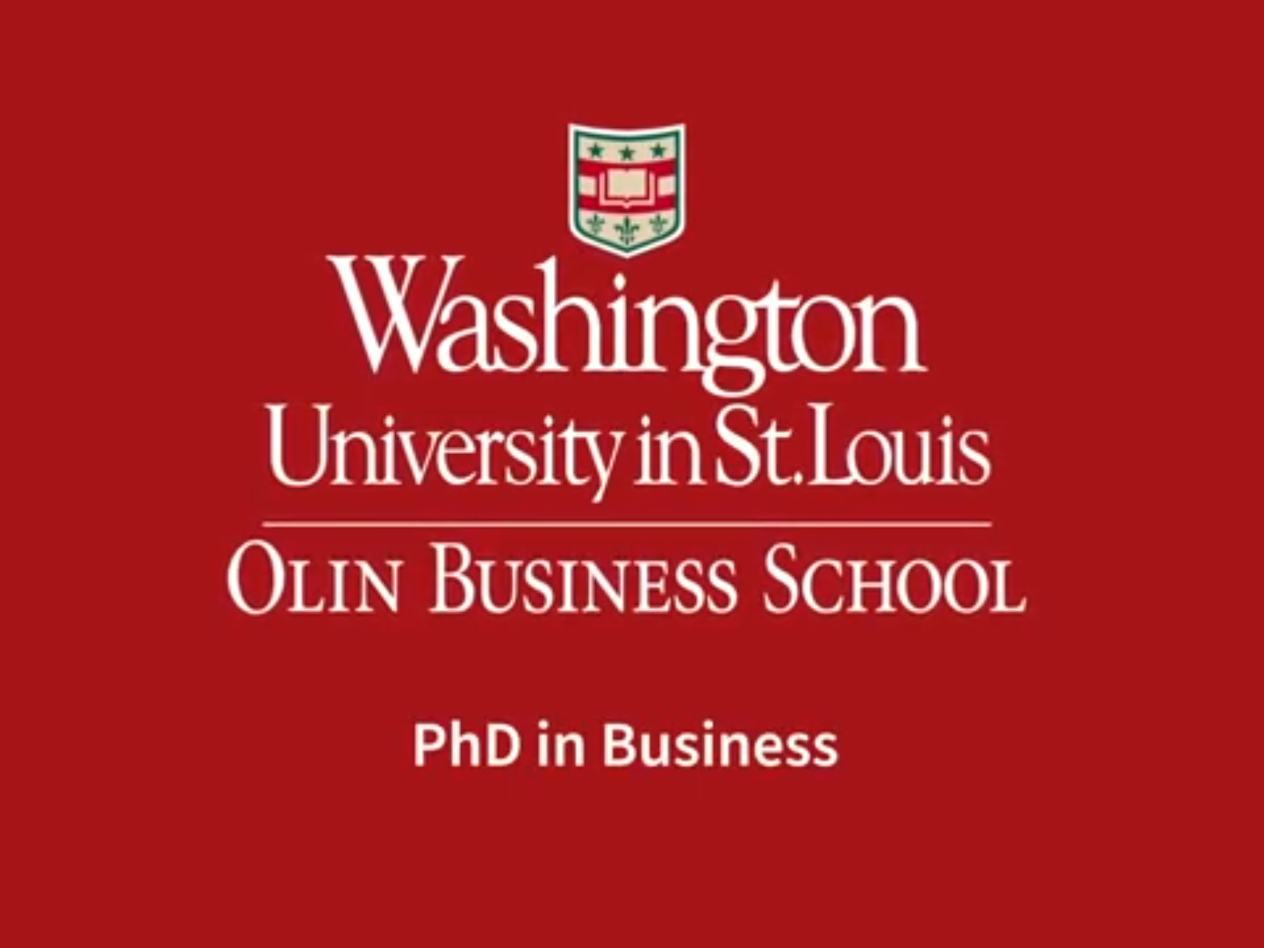The Science of Selling

PhD in Marketing Science or Consumer Behavior
At Olin, the marketing discipline is distinguished by a demand for innovative ideas, critical thinking and an emphasis on quantitative abilities.
PhD students in marketing typically choose one of the two areas of study: Marketing Science and Consumer Behavior. Some choose to analyze the intersection of the two areas seeking to improve understanding and predict marketing phenomena.
Marketing Science
Marketing Science focuses on the quantitative—economic fundamentals that include microeconomic theory and econometrics. Using this methodology, you examine mathematical modeling of buyer-seller interactions, consumer choices, purchase behavior, resource allocation, components of the marketing mix and new product development.
The methods below help you determine the best way to allocate marketing resources.
- Conduct empirical tests on the implications of these models
- Quantify the effectiveness of different strategies
- Explore the profit implications of using alternative strategies
In Marketing Science, we conduct empirical tests on the implications of these models, quantify the effectiveness of different strategies and explore the profit implications of using alternative strategies. We identify important drivers that should govern strategic decisions and, consequently, the allocation of marketing resources.
Consumer Behavior
Consumer Behavior concentrates on psychology fundamentals and understanding how people make decisions, including cognitive psychology, social psychology and behavioral decision theory. These areas provide a strong foundation as you study and research consumer judgment and decision-making, cognition, culture, emotions, motivation, individual differences, perception and social influence.
Faculty members work on a variety of topics related to judgment and decision-making. Current and recent research topics include biases in judgment and choice, choice assortments, prosocial behavior, financial decision making, branding, intertemporal choice, morality and consumption, preferences for natural products, gift giving and metacognition.
Marketing Faculty and Research
Olin’s marketing faculty pursue research focused on building frameworks and models to understand and evaluate marketing strategies and their impact on customers, consumers and competitors. This research provides decision makers the ability to think beyond current practices and offers answers to significant "what if" questions.
Research papers by faculty members have recently been published in well-respected journals such as:
- Marketing Science
- Journal of Consumer Research
- Journal of Marketing Research
- Journal of Marketing
- Marketing Letters
Read about collaborative research by Marketing faculty and PhD students.
 Play video
Play video
Olin Doctoral Series | PhD Marketing
At WashU Olin, marketing is distinguished by a demand for innovative ideas, critical thinking and a strong emphasis on quantitative abilities.
Center for Analytics and Business Insights
The Center for Analytics and Business Insights is a hub for research and ideas, with opportunities for faculty, students and companies to collaborate.
Read more about CABIConsumer Behavior Curriculum
-
First Year
Research
Begin research collaborations with faculty
Milestones
First-year summer paper
- Focuses on research completed in year 1
- Brief publication-style research paper with data/results
- In August after the first year, students must attend an RA/TA training offered by the Center for Teaching and Learning
Classes
First Semester Classes
- Tools Course: Quantitative Methods I (Psych 5066, 3 credits)
- Seminar in Consumer Behavior I (MKT 601, mini course, 1.5 credits)
- Social Psychology Seminar or other social science elective (e.g., Social Cognition, 3 credits)
- Social Science Elective (e.g., seminar in psychology, OB, social work or experimental economics)
- Tools Course: Quantitative Methods II (Psych 5067, 3 credits)
- Behavioral and Experimental Research Methods I (MKT 600A, mini course, 1.5 credits)
- Judgment and Decision Making I (MKT 674, mini course, 1.5 credits)
- Organizational Research Methods (OB 630, 3 credits)
The order of classes may change due to availability, and classes may be substituted with approval. A communications course that focuses on oral communication is also recommended during the first two years. When the student takes the course is determined by the student and their advisor. -
Second Year
Research
Research—developing toward publication
Milestones
Paper from 1st year presented in fall or spring semester (ideally fall)
Comprehensive Exams due summer after 2nd year
- Breadth—Open book essays based on extensive reading list
- Depth—Original research proposal
- Review—Write a journal article review
Classes
Third Semester
- Tools Course: Quantitative Methods (e.g., Research Designs and Methods, Psych 5011, 3 credits)
- Seminar in Marketing Management (MKT 670, 1.5-3 credits)
- Seminar in Consumer Behavior II (MKT 601, mini course, 1.5 credits)
- Social Science Elective (e.g., seminar in psychology, OB, social work or experimental economics)
Fourth Semester
- Tools Course: Quantitative Methods (e.g., Applied Multivariate Analysis, Psych 516, 3 credits)
- Behavioral and Experimental Research Methods II (MKT 600B, mini course, 1.5 credits)
- Judgment and Decision Making I (MKT 674, mini course, 1.5 credits)
- Social Science Elective (e.g., seminar in psychology, OB, social work or experimental economics)
-
Third Year
Research
- Research—developing toward publication
Milestones
Second year paper due and presented at the end of fall semester
- Paper should focus on research completed in year 2
- Publication-style research paper with data/results
- Options for paper
- extension of 1st year paper, if substantially different
- extension of depth exam
- new project
Classes
- B53 660 Seminar in Presentation Skills (fall semester, required)
- Improvisation Course
-
Fourth Year
Research
- Research—developing toward publication, academic job market and dissertation
Milestones
Dissertation Proposal—Students must assemble a Research Advisory Committee for the proposal of their dissertation and submit a Title, Scope and Procedure Form at the committee’s approval of the proposed dissertation by September 30 after the fourth year.
- Ideally, the dissertation proposal will be submitted and presented by end of spring semester of the fourth year. September 30 after the fourth year is the final deadline.
- The dissertation proposal and dissertation must propose/describe a substantial and novel body of research that is significantly different from previous milestone submissions.
- The dissertation may incorporate previous milestone research, but must go well beyond it.
-
Fifth Year
Research
Research—Developing toward publication, job market and dissertation
Milestones
- Intent to Graduate (complete form online)
- Job market and placement
- Oral defense of dissertation
- Submission of Examination Approval form which signifies committee’s approval
- Upload of final, approved Dissertation to Graduate School of Arts and Sciences
- Submission of Documented Teaching Requirements to PhD office
-
General Expectations
- Attend all marketing department research seminars, lab meetings, journal club meetings, proseminar meetings and speaker meetings.
- Be collegial.
- All milestones will be evaluated by ≥ 2 faculty who will grade and provide comments.
- A Passing grade (or higher) must be received on each milestone.
- Grading scale: High Pass, Pass, Low Pass, Fail
- By August 1 each year, review progress annually with Faculty/PhD Program Staff.
- Course Descriptions
Marketing Science Curriculum
-
Prework
Prior to the first year—mandatory attendance at math camp (offered through the Economics department)
-
First Year
Recommended Course Sequence
First Semester
- MEC 610 Microeconomics I (3 credits)
- Econometrics Course* (3 credits)
- MKT680 or 681 Machine Learning for Business Applications (3 credits)
- B53 620 Empirical Methods in Business** (3 credits)
- Olin PhD Marketing courses (variable)
Second Semester
- MEC 611 Microeconomics II (3 credits)
- L11 Quantitative Methods II (3 credits)
- Olin PhD Marketing Courses (variable)
*Students may choose one Econometrics course from the following options. All courses are not offered every semester, and courses are subject to change.
Options:
- L11 5161 Applied Econometrics
- B54 670 Seminar in Econometrics
The order of classes may change due to availability, and classes may be substituted with approval. A communications course that focuses on oral communication is also recommended during the first two year. When the student takes the course is determined by the student and his/her advisor.
Research
- Attend Marketing seminars
- Begin research collaborations
Milestones
- In the summer after the first year, students must meet with the faculty coordinator to discuss progress and complete a progress report to be submitted to the PhD Office by August 1 after the first year.
- Micro Prelim Exam is offered in June. Students must receive a “Distinction/Honors” or “PhD pass” to continue in the PhD program. One retake of the exam is permitted.
Exemptions: Students do not need to take the exam if they obtain an average A- grade or above for the two Microeconomics courses in the first year, or obtain an average A- grade or above for all courses taken in the first year. - In August after the first year, students must attend an RA/TA orientation offered by The Teaching Center.
- First-year research paper: Students are required to finish the paper and present to the marketing faculty before the end of the fall semester in the second year.
-
Second Year
Courses
- MKT680 or 681 Machine Learning for Business Applications (3 credits)
- Olin PhD Marketing Courses
- Electives (directed readings, independent studies)
Research
- Attend Marketing seminars
Milestones
- Qualifying field exam: Students are required to pass the exam by the end of September. One retake of the exam is permitted.
- Second-year research paper: Students are required to finish the paper and present to the marketing faculty before the end of the fall semester in the second year.
- In the summer, students must meet with the faculty coordinator to discuss progress and complete a progress report to be submitted to the PhD Office by August 1.
-
Third Year
Courses
B53 660 Seminar in Presentation Skills (fall semester, required)
Improvisation CourseResearch
- Attend Marketing seminars
- Paper presentations (brown bag seminars and conferences)
- Dissertation research
Milestones
- In the summer, students must meet with the faculty coordinator to discuss progress and complete a progress report to be submitted to the PhD Office by August 1.
-
Fourth Year
Research
- Attend Marketing seminars
- Paper presentations (brown bag seminars and conferences)
- Dissertation research
Milestones
- Dissertation Proposal – students must be able to assemble a Research Advisory Committee for the proposal of their dissertation and must submit a Title, Scope and Procedure form as the committee’s approval of the proposed dissertation by September 30 after the fourth year.
- In the summer, students must meet with the faculty coordinator to discuss progress and complete a progress report to be submitted to the PhD Office by August 1.
-
Fifth Year
Research
- Attend Marketing seminars
- Paper presentations (job market paper presentations with faculty and at conferences)
- Dissertation research
Milestones
- Intent to Graduate (complete form online)
- Job market and placement
- Oral defense of dissertation
- Submission of Examination Approval form which signifies committee’s approval
- Upload of final, approved Dissertation to Graduate School of Arts and Sciences
- Submission of Documented Teaching Requirements to PhD office
- Course Descriptions
Full-Time Marketing Faculty Members
Meet the professors who will be your mentors and research collaborators. See more in our faculty directory.


Contact Us
Doctoral Programs
Campus Box 1133-124-05
One Brookings Drive
St. Louis, MO 63130-4899
Office Hours:
Monday–Friday 9:00 a.m. to 5:00 p.m.